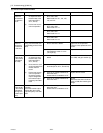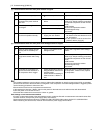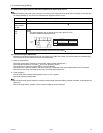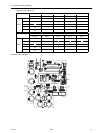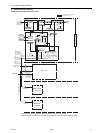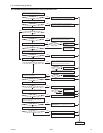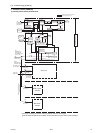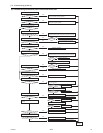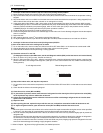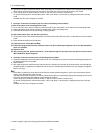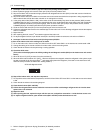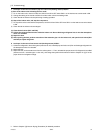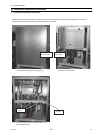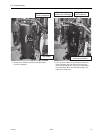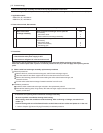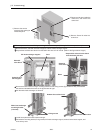
[ IX Troubleshooting ]
- 343 -
HWE09080 GB
[5] Refrigerant Leak
1. Leak spot: In the case of extension pipe for indoor unit (Cooling season)<PQHY>
1) Mount a pressure gauge on the service check joint (CJ2) on the low-pressure side.
2) Stop all the indoor units, and close the liquid service valve (BV2) inside the heat source unit while the compressor is being
stopped.
3) Stop all the indoor units; turn on SW2-4 on the heat source unit control board while the compressor is being stopped.(Pump
down mode will start, and all the indoor units will run in cooling test run mode.)
4) In the pump down mode (SW2-4 is ON), all the indoor units will automatically stop when the low pressure (63LS) reaches
0.383MPa [55psi] or less or 15 minutes have passed after the pump mode started. Stop all the indoor units and compressors
when the pressure indicated by the pressure gauge, which is on the check joint (CJ2) for low-pressure service, reaches
0.383MPa [55psi] or 20 minutes pass after the pump down operation is started.
5) Close the gas service valve (BV1) inside the heat source unit.
6) Collect the refrigerant that remains in the extended pipe for the indoor unit. Do not discharge refrigerant into the atmosphere
when it is collected.
7) Repair the leak.
8) After repairing the leak, vacuum
*1
the extension pipe and the indoor unit.
9) To adjust refrigerant amount, open the service valves (BV1 and BV2) inside the heat source unit and turn off SW2-4.
2. Leak spot: In the case of heat source unit (Cooling season)<PQHY>
(1) Run all the indoor units in the cooling test run mode.
1) To run the indoor unit in test run mode, turn SW3-2 from ON to OFF when SW3-1 on the heat source control board is ON.
2) Change the setting of the remote controller for all the indoor units to the cooling mode.
3) Check that all the indoor units are performing a cooling operation.
(2) Check the values of Tc and TH6.
(To display the values on the LED screen, use the self-diagnosis switch (SW1) on the heat source unit control board.)
1) When Tc-TH6 is 10°C [18°F] or more : See the next item (3).
2) When Tc-TH6 is less than 10°C [18°F] : After the compressor stops, collect the refrigerant inside the system, repair the leak,
perform evacuation, and recharge new refrigerant. (Leak spot: 4. In the case of heat source unit, handle in the same way as
heating season.)
(3) Stop all the indoor units, and stop the compressor.
1) To stop all the indoor units and the compressors, turn SW3-2 from ON to OFF when SW3-1 on the heat source control board
is ON.
2) Check that all the indoor units are being stopped.
(4) Close the service valves (BV1 and BV2).
(5) To prevent the liquid seal, extract small amount of refrigerant from the check joint of the liquid service valve (BV2),
as the liquid seal may cause a malfunction of the unit.
(6) Collect the refrigerant that remains inside the heat source unit.Do not discharge refrigerant into air into the atmo-
sphere when it is collected.
(7) Repair the leak.
(8) After repairing the leak, replace the dryer with the new one, and perform evacuation inside the heat source unit.
(9) To adjust refrigerant amount, open the service valves (BV1 and BV2) inside the heat source unit.
When the power to the heat source-indoor unit must be turned off to repair the leak after closing the service valves specified
in the item 4, turn the power off in approximately one hour after the heat source-indoor units stop.
1) When 30 minutes have passed after the item 4 above, the indoor unit lev turns from fully closed to slightly open to prevent the
refrigerant seal.
LEV2a and LEV2b open when the heat source unit remains stopped for 15 minutes to allow for the collection of refrigerant in
the heat source unit heat exchanger and to enable the evacuation of the heat source unit heat exchanger.
If the power is turned off in less than 5 minutes, LEV2a and LEV2b may close, trapping high-pressure refrigerant in the heat
source unit heat exchanger and creating a highly dangerous situation.
*1. Refer to Chapter I [8] Vacuum Drying (Evacuation) for detailed procedure.
Tc self-diagnosis switch TH6 self-diagnosis switch
ON
12345678 9 10
SW1
12345678 9 10
ON
SW1



